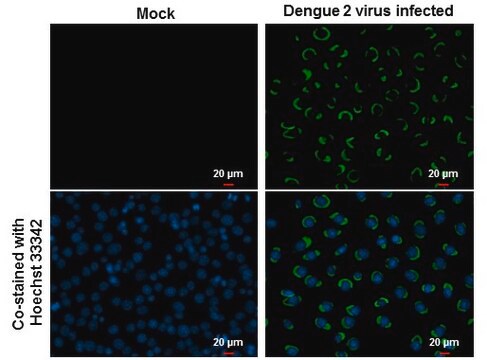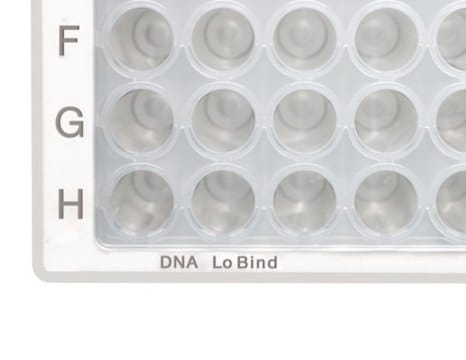MAB8702
Anti-Dengue Virus Type II Antibody, clone 3H5-1
clone 3H5-1, Chemicon®, from mouse
Anmeldenzur Ansicht organisationsspezifischer und vertraglich vereinbarter Preise
Alle Fotos(1)
About This Item
UNSPSC-Code:
12352203
eCl@ss:
32160702
NACRES:
NA.41
Empfohlene Produkte
Biologische Quelle
mouse
Qualitätsniveau
Antikörperform
purified immunoglobulin
Klon
3H5-1, monoclonal
Speziesreaktivität
human
Hersteller/Markenname
Chemicon®
Methode(n)
immunofluorescence: suitable
inhibition assay: suitable (hemagglutination)
Isotyp
IgG1
Versandbedingung
wet ice
Allgemeine Beschreibung
Dengue fever is an acute, mosquito-transmitted viral disease characterized by fever, headache, arthralgia (severe retro-orbital pain), myalgia, rash, nausea, and vomiting. Infections are caused by any of the four closely related, but antigenically distinct virus serotypes (DEN-1, DEN-2, DEN-3, and DEN-4). Infection with one of these serotypes does not provide cross-protective immunity, so persons living in a dengue-endemic area can have four dengue infections during their lifetimes. Dengue is primarily an urban disease of the tropics, and the viruses that cause it are maintained in a cycle that involves humans and Aedes aegypti, a domestic, day-biting mosquito that prefers to feed on humans. Although most dengue infections result in relatively mild illness, some can produce Dengue Hemorrhagic Fever (DHF) or dengue shock syndrome, with children being particularly at risk. Although epidemic outbreaks have been reported since 1779, the incidence has been increasing, with global, multiple serotype pandemics intensifying within the last 15 years. There is no specific antiviral therapy for dengue, but for both classical dengue and dengue hemorrhagic fever, symptomatic and supportive measures are effective. Important risk factors for DHF include the strain and serotype of the virus involved, as well as the age, immune status, and genetic predisposition of the patient.
Spezifität
Reacts with the Dengue type 2 virus.
Immunogen
Dengue type 2 antigen (New Guinea C).
Anwendung
Research Category
Infektionskrankheiten
Infektionskrankheiten
Research Sub Category
Virale Infektionskrankheiten
Virale Infektionskrankheiten
Recommended for use in an immunofluorescent assay. Also suitable for use in hemagglutination-inhibition tests and plaque-reduction assays.
IFA: 1:200-1:400.
Dilute with buffer pH 7.5-8.0 to desired working volumes. For extensive dilution, protein containing or other stabilizing medium should be used.
Final working dilutions must be determined by end user.
IFA: 1:200-1:400.
Dilute with buffer pH 7.5-8.0 to desired working volumes. For extensive dilution, protein containing or other stabilizing medium should be used.
Final working dilutions must be determined by end user.
This Anti-Dengue Virus Type II Antibody, clone 3H5-1 is validated for use in HI, IF for the detection of Dengue Virus Type II.
Physikalische Form
Protein G Purified
Format: Purified
Protein G Purified immunoglobulin. Liquid in 0.02 M PB, 0.25 M NaCl, pH = 7.6 with 0.1% Na Azide as a preservative
Lagerung und Haltbarkeit
Maintain at 2°C to 8°C in undiluted aliquots for up to 12 months after date of receipt.
Hinweis zur Analyse
Control
Dengue positive patient sample
Dengue positive patient sample
Sonstige Hinweise
Concentration: Please refer to the Certificate of Analysis for the lot-specific concentration.
Rechtliche Hinweise
CHEMICON is a registered trademark of Merck KGaA, Darmstadt, Germany
Haftungsausschluss
Unless otherwise stated in our catalog or other company documentation accompanying the product(s), our products are intended for research use only and are not to be used for any other purpose, which includes but is not limited to, unauthorized commercial uses, in vitro diagnostic uses, ex vivo or in vivo therapeutic uses or any type of consumption or application to humans or animals.
Lagerklassenschlüssel
10 - Combustible liquids
WGK
WGK 2
Flammpunkt (°F)
Not applicable
Flammpunkt (°C)
Not applicable
Analysenzertifikate (COA)
Suchen Sie nach Analysenzertifikate (COA), indem Sie die Lot-/Chargennummer des Produkts eingeben. Lot- und Chargennummern sind auf dem Produktetikett hinter den Wörtern ‘Lot’ oder ‘Batch’ (Lot oder Charge) zu finden.
Besitzen Sie dieses Produkt bereits?
In der Dokumentenbibliothek finden Sie die Dokumentation zu den Produkten, die Sie kürzlich erworben haben.
Sialic acid expression in the mosquito Aedes aegypti and its possible role in dengue virus-vector interactions.
Cime-Castillo, J; Delannoy, P; Mendoza-Hernandez, G; Monroy-Martinez, V; Harduin-Lepers et al.
BioMed Research International null
Characterization of the early events in dengue virus cell entry by biochemical assays and single-virus tracking.
van der Schaar, HM; Rust, MJ; Waarts, BL; van der Ende-Metselaar, H; Kuhn, RJ; Wilschut et al.
Journal of virology null
Leticia Franco et al.
PLoS neglected tropical diseases, 5(8), e1251-e1251 (2011-08-11)
Dengue virus (DENV) circulates in human and sylvatic cycles. Sylvatic strains are both ecologically and evolutionarily distinct from endemic viruses. Although sylvatic dengue cycles occur in West African countries and Malaysia, only a few cases of mild human disease caused
Rodrigo Guabiraba et al.
European journal of immunology, 43(6), 1529-1544 (2013-03-19)
Dengue virus (DENV), a mosquito-borne flavivirus, is a public health problem in many tropical countries. IL-22 and IL-17A are key cytokines in several infectious and inflammatory diseases. We have assessed the contribution of IL-22 and IL-17A in the pathogenesis of
Zhi-Shan Zhang et al.
Molecular medicine reports, 11(2), 1009-1016 (2014-11-06)
There is currently no effective vaccine to prevent dengue infection, despite the existence of multiple studies on potential methods of immunization. The aim of the present study was to explore the effect of DNA and/or recombinant protein on levels of
Unser Team von Wissenschaftlern verfügt über Erfahrung in allen Forschungsbereichen einschließlich Life Science, Materialwissenschaften, chemischer Synthese, Chromatographie, Analytik und vielen mehr..
Setzen Sie sich mit dem technischen Dienst in Verbindung.





